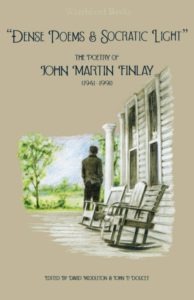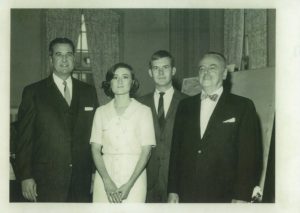The Poetry of John Martin Finlay
Reading the poems of John Martin Finlay is like meeting someone you should have known, figuratively and literally.
Finlay (1941-1991) received his B.A. and M.A. degrees from the University of Alabama. For his Ph.D., he chose Louisiana State University because of Donald Stanford, then editor of LSU’s literary journal The Southern Review. He enrolled in 1970—when I was a sophomore at LSU. We never met, but we likely came close a few times. I was a journalism major, taking two courses in English literature—the ones the English majors took. And I read the The Southern Review.
But I moved in undergraduate journalism and campus political circles; Finlay moved in English, literary and graduate school circles. We likely passed each other in Allen Hall, the building where most of the English classes were taught and where the professors had their offices. But we never met.
Wiseblood Books has published two volumes of Finlay’s work. Dense Poems & Socratic Light is the most complete collection of his poetry, including several unpublished poems found in Finlay’s papers at LSU. With Constant Light is his collected essays and reviews, including writings from his diaries, letters, and other works. Both books are edited by David Middleton, professor emeritus, and John Doucet, dean of the College of Sciences and Technology, both at Nicholls State University in Louisiana. Both are also published poets and authors.
After reading Dense Poems & Socratic Light, I would have liked to have met him. The poems are largely about two general subjects: life in the South, and Greek and Roman mythology. Co-editor Middleton, who was also Finlay’s best friend and literary executor, cites the major influences on Finlay as the Southern Agrarians (Robert Penn Warren, Allen Tate, and others) and poet Yvor Winters. Middleton knew Finlay well, and he, along with his co-editor John Doucet, have had much to do with keeping Finlay’s poetry and prose alive.
Many of the poems collected for this volume have an inherent beauty, exhibiting a strong sense of place and region portrayed as personal experience. Finlay spent his childhood years on the family farm, a boy who did chores while reciting lines of Shakespeare. His interest may have been in literature, but his poetry embodies that sense of place, family, and people.
The Road to the Gulf

Gleaming above a green deep river’s bank,
We passed before the pastures still unmowed
And melons piled for sale beside the road.
Samples were cut on shells of oyster blue.
So ripe the seedless heart had split in two.
The closer to the Gulf we came the more
The flattened earth recalled itself as shore.
The needle of the pine, metallic leaf,
Grew where lusher life could come to grief.
The soil lay dreaming of the ancient salt,
A trance of heat inside the summer’s vault.
It cooled by evening when we reached the bay.
Blacked vistas opened out; just miles away,
We felt the plunging shelves of rising sea.
The boats were in; at shore beneath a tree
The scaling boys half-naked, brown as nuts,
Threw to the blue crabs the fishes’ guts.
I’ve driven a road like that to the Gulf of Mexico, a bit to the west of where Finlay went. Many times, when I was a child, my family drove the old Highway 90 from New Orleans to Biloxi, and several times I drove my own family from just east of Mobile south on Highway 59 to Gulf Shores. And it was like Finlay describes—the pine trees, the melon stands, the soil “dreaming of ancient salt,” the “shelves of the rising sea.” We missed the fishes’ guts and the crabs, however.
His subjects include family, literature, war, artists, the saints, faith, and many others. Six poems, grouped together under the title of “The American Tragedies: A Chronology of Six Poems,” deal with the settling of the South, including the Civil War and stories told about what happened to some of the area’s people, among them an Italian immigrant. One poem in that series, “The Blood of Shiloh,” deals with what today we call PTSD; it is simply a wonderful poem.
Finlay wrote form poems at a time when they were going out of fashion. The “New Formalism” arose after his death and likely helped renew interest in his poetry. Middleton also edited collections of Finlay’s work published posthumously.
While he worked on his Ph.D. from 1970 to 1980, Finlay lived in Baton Rouge, except for 1972-73, when he lived in Corfu and Paris (several poems in the collection reflect that experience). In 1980, he received his Ph.D. and joined the Roman Catholic Church. Shortly after that, he moved to the family home in Ozark, Alabama, where he wrote essays, reviews, and poetry. A few of the poems deal directly and rather movingly with his health; he died of AIDS in 1991.
Dense Poems & Socratic Light, with its extensive notes and appendices, is a work you read almost in awe. The editors have done a superb job of bringing Finlay’s poetry, and his life, together in an extremely accessible way. He was a fine poet and deserves to be known and read. This volume will help that immeasurably.
Photo by Omer Unlu, Creative Commons, via Flickr. Post by Glynn Young.
How to Read a Poem uses images like the mouse, the hive, the switch (from the Billy Collins poem)—to guide readers into new ways of understanding poems. Anthology included.
“I require all our incoming poetry students—in the MFA I direct—to buy and read this book.”
—Jeanetta Calhoun Mish
- Longfellow’s “Paul Revere’s Ride”: Creating a National Legend - April 17, 2025
- Poets and Poems: Katie Kalisz and “Flu Season” - April 15, 2025
- Poets and Poems: Michelle Ortega and “When You Ask Me, Why Paris?” - April 10, 2025



Bethany R. says
“A small white town, its silver water-tank
Gleaming above a green deep river’s bank,
We passed before the pastures still unmowed
And melons piled for sale beside the road.”
Such a sense of calm in these couplets. Love how recalls simple pleasures and interweaves an appreciation for what was.